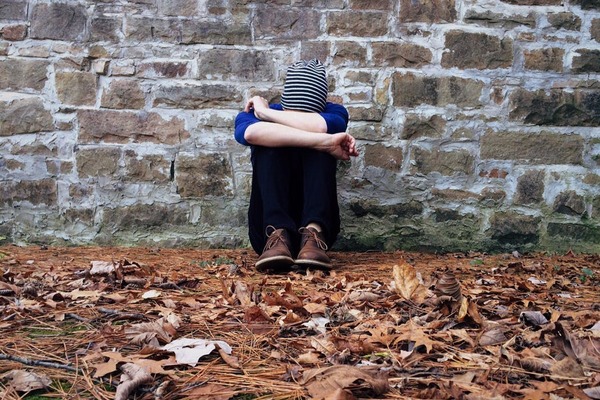It’s time to talk about a fundamental factor which greatly impacts those experiencing homelessness: mental illness.
When you consider that four in five homeless people suffer from a mental health problem, it brings into stark reality just how serious this issue is. Mental health in the homeless community really is at crisis point.
Today is World Homeless Day and World Mental Health Day – a day about raising awareness of these pressing issues and highlighting the links between homelessness and mental health.
To mark this unique day, we asked three key people to Providence Row to jointly discuss how mental health is frequently a cause and consequence of homelessness. We held a conversation between Nora, our Outreach Psychotherapist*; **James, one of our Service Users, and Dom, our Director of Services.
We thought we would share some of the highlights of this discussion:
Why is homelessness on the rise?
James: “There are so many mental health issues tied in to homelessness. Exposure to drugs, particularly at an earlier age now, and general drug abuse. It’s getting more and more pronounced. “
“Homelessness can affect anyone. It’s not specific to one group or the other. The reality is that it can happen to anyone, a lot more quickly than one might think.”
Nora:
“In light of the high cost of rental accommodation and a lack of job opportunities, it’s no surprise that people are becoming homeless. Drug use, mental health issues and historic traumatic experiences, or a combination of all of these, are also resulting in people ending up on the streets. They have no choice but to survive.”
Dom: “There’s a whole host of systematic issues that are contributing to the rise of homelessness. Welfare reforms, lack of social and affordable housing and an insecure job market are all exacerbating the dramatic increase in homelessness.”
Why is there such a strong correlation between mental health and homelessness?
James: “First, drug abuse will undermine your mental wellbeing in a significant way. Also, any trauma that’s not been addressed from childhood will linger and haunt you. Many homeless people have experienced difficult childhoods, unstable families and or domestic violence.”
“Trauma drives homelessness and homelessness can increase traumatic exposure. I feel that all homelessness services should be trauma-informed, and hence more alert to the causes of mental health issues.”
Nora: “When you don’t have the stability and the security that housing provides that can really affect you. Then there’s the continuous community and social exclusion, loss of peace and dignity. All of these factors will impact one’s mental health.”
“Having a mental health problem can also be the very reason for someone becoming homeless. There is still a lot of stigma associated with mental health issues. When you combine homelessness and mental health challenges, these two issues can be frightening and difficult to address.”
Dom: “The connection between homelessness and mental illness is complicated but simple at the same time. It’s effectively a two-way relationship. The combination of mental illness and homelessness can lead to other factors such as increased levels of alcohol and drug abuse that reinforce the connection between mental health and homelessness.”
“It’s sad to say that affective disorders such as depression and bipolar disorder, schizophrenia, anxiety disorders and substance abuse disorders are among the most common types of mental illness in the homeless population.”
What’s needed to improve this situation?
James:
“The government needs to have a better understanding of homelessness to provide more effective services. Services such as the psychotherapy outreach that Providence Row provides is something that should be replicated elsewhere.”
“To change homelessness, you need to first help yourself. It needs to come within you - that force and motivation. But we also need to equip people to develop that kind of motivation. In other words, help the person help themselves. For instance, it can be really hard if you’ve been homeless for ten years and you haven’t slept on a bed for a decade. Or even to stay in a hostel after ten years on the streets. So how can we make it an easier transition for people experiencing homelessness?”
Nora:
“We need more flexible and understanding services for people experiencing homelessness. Professionals working with a trauma-informed approach can play a vital role. In the care that’s provided to people experiencing homelessness, it’s important to offer unreserved engagement and inclusion. Showing interest and a positive and hopeful attitude will help our clients to feel encouraged, supported, and accepted. This makes a difference.”
Dom:
“We need to look at improving education, family relationships, the prison and care system, as well as mental health and substance misuse support provision. Homelessness is not about just solving someone’s housing issue. It’s also about examining someone’s overall situation and the root causes of their homelessness.”
* Here at Providence Row we take mental health very seriously and are fortunate to have Nora, an Outreach Psychotherapist, who works with people affected by homelessness, outside on the streets, in parks, cafes or in churches. This role is funded by the Rough Sleeping Initiative and covers the borough of Tower Hamlets.
Working together with the Tower Hamlets Street Outreach Team (SORT) Nora works with people experiencing homelessness psycho-therapeutically. Nora helps them to gain or maintain their accommodation and works through any other issues that might be affecting their recovery.
**We have changed the name of our client to protect his identity.






